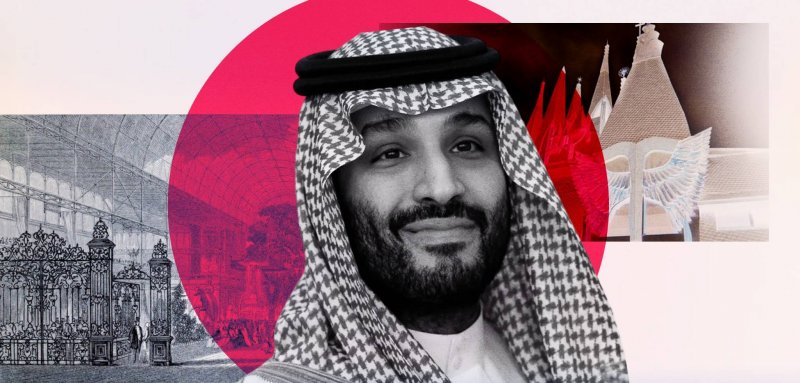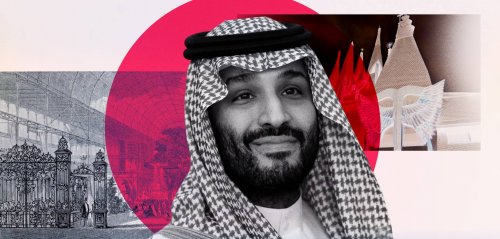News outlets last month were dominated by the announcement that Riyadh, the capital of the Kingdom of Saudi Arabia, successfully won the bid to host Expo 2030, beating the Italian city of Rome and the Korean city of Busan.
The Arab media's reception of this victory suggests that we are witnessing a significant moment, warranting pride and celebration. But the question here is: What is the story of Expo? How did it start? How has its direction changed? Why all this celebration, and does Saudi Arabia need it, or is it the other way around?
What is the story of Expo? How did it start? How has its direction changed? Why all this celebration, and does Saudi Arabia need it, or is it the other way around?
Expo.. The Dream of an English Prince
In 1846, Prince Albert, husband of British Queen Victoria, met Henry Cole, editor of the British magazine Design. The two men connected over language, their shared homeland, and a mutual and strong passion for science and innovation. Hence, the Society for the Encouragement of Arts, Manufactures, and Commerce became the Royal Society.
On the other side of the English Channel, France had just organized its first industrial exhibition, to great success. The two men were delighted by it, and encouraged to move forward with the launch of their exhibition.
Although this project involved the Queen's husband, the British government was not initially enthusiastic about it. However, Prince Albert and Henry discussed self-funding the exhibition (an innovative idea at the time), and increasing pressure led the government to reluctantly establish a royal committee to explore and study the idea further. The committee was enthusiastic, especially by the concept of ‘self-funding’, and a mix of admiration and national pride drove them to insist that this exhibition be more important and significant than the one organized by the French.
The exhibition was initially focused on industry in its broadest sense, an outcome of the recent industrial revolution, and served as a platform for the latest inventions and modern technology, such as the telephone.
Hyde Park Hosts the Iron Structure
After the idea was approved, a massive structure was built in Hyde Park, London, to host the exhibition. The government allocated approximately 5,000 soldiers to build the structure, which was 564 meters long and 33 meters tall.
The Great Exhibition was inaugurated by Queen Victoria on May 1, 1851, and displayed almost all the wonders of Victorian era industry and innovation. Although the original purpose of the Fair was to celebrate industrial development in various countries, Britain acquired more than half of the exhibition space.
It was an astonishing success, with records indicating that nearly 6 million visitors attended from May to October 1851. This was a staggering turnout for the time, leading many to consider the exhibition to be one of the most significant accomplishments of the 19th century.
Developments in Expo's Paths and Objectives
The exhibition was initially focused on industry in its broadest sense, an outcome of the recent industrial revolution, and served as a platform for the latest inventions and modern technology, such as the telephone.
Will Saudi Arabia reap the benefits of the billions it spends on stadiums and exhibitions soon?
The major shift in the exhibition's trajectory occurred in 1939, at the New York World's Fair, titled ‘Building the Future’. Focus shifted towards displaying the cultural and social aspects of each participating country. The focus on social themes continued, with the 1964 exhibition titled ‘Peace Through Understanding’, followed by ‘Man and His World’ in 1967. It became clear that the exhibitions sought to encourage cultural convergence and the exchange of technological innovation.
The exhibition title was also changed from ‘Fair’ to ‘Expo’ for the 1976 Montreal Expo (the famous, now-retired Montreal baseball team was named after this). The term ‘Expo’ has been used since.
A major shift occurred in 1939, at the New York World's Fair. Focus shifted towards displaying the cultural and social aspects of each participating country. It became clear that the exhibitions sought to encourage cultural convergence and the exchange of technological innovation
Marketing for Countries, Not for Industry
In its earlier decades, the exhibition sought to display primarily technological, then cultural, advancement and innovation. From 1988, with the rise of ‘soft power’, as coined by Joseph Nye, a professor of political science at Harvard political, a shift occurred in the exhibition's philosophy. Expo transformed into a political marketing tool for exhibiting countries, where boasting invention and financial gain was no longer a main objective.
This was evident in the 1992 Seville Expo, which Spain used to present itself as a modern state following its accession to the European Union. That year, Spain also hosted the Summer Olympics.
In its earlier decades, the exhibition sought to display technological and cultural innovation. From 1988, with the rise of ‘soft power’, Expo transformed into a political marketing tool for exhibiting countries, where boasting invention and financial gain was no longer a main objective.
The Gulf Dominates Expo
The Arab world entered the Expo scene in 2020, after the UAE hosted Expo Dubai 2020 and generously invested in it. Estimates indicate that the budget exceeded $6.5 billion US dollars, a massive figure that calls into question whether the material results obtained by the UAE equal the amount spent. Official statements, however, reveal that Expo Dubai resulted in a 5% increase in the country’s overall GDP. Regardless, it is clear that Expo Dubai was an opportunity to enhance the city’s status as a destination for luxury entertainment tourism.
Why did Expo leave the Western countries to settle in the Gulf?
Expo Riyadh 2030... Bin Salman's Dream
If the budget for Expo Dubai 2020 neared $6 billion dollars, the initial, and expandable, budget for Expo Riyadh is a record $7.8 billion dollars. Can one expect returns from the exhibition to cover these costs?
The answer is likely no. Financial profit is not the primary goal for the Kingdom. The motivation here is fundamentally political, or more precisely, promotional. Saudi Arabia is changing its image, swiftly altering its perception as an oil-rich and religious country as it works to open up, and host the arts, sports, and other emerging projects. The Riyadh Festival, the billions spent on football and its players, and the cost of Expo Riyadh 2030 all contribute to this transformation.
If the budget for Expo Dubai 2020 neared $6 billion dollars, the initial, and expandable, budget for Expo Riyadh is a record $7.8 billion dollars. Can one expect returns from the exhibition to cover these costs?
Industry, technology, and cultural exchange are no longer the primary objectives of the exhibition. Instead, Expo serves as political promotion, solidifying the image that oil-rich countries seek to advance about themselves and their future. In this, competitors vie for attention.
Raseef22 is a not for profit entity. Our focus is on quality journalism. Every contribution to the NasRaseef membership goes directly towards journalism production. We stand independent, not accepting corporate sponsorships, sponsored content or political funding.
Support our mission to keep Raseef22 available to all readers by clicking here!
Interested in writing with us? Check our pitch process here!






